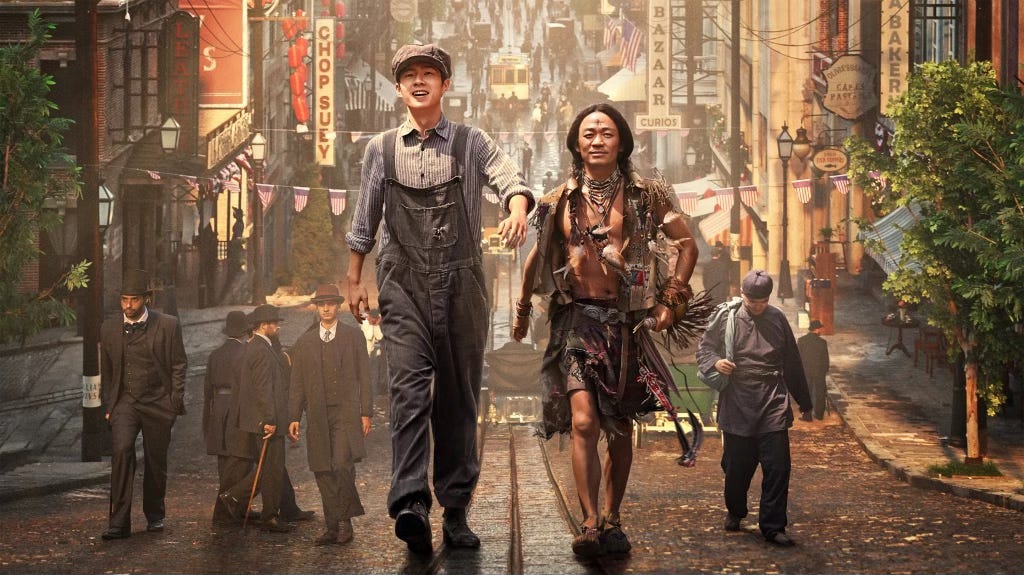Detective Chinatown 1900
A Genre-Blending Expedition into Historical Trauma and Triumph
Film Review
‘Detective Chinatown 1900’ (唐探1900), the fourth instalment in China’s blockbuster franchise, transcends its comedic-mystery roots to deliver a visually opulent, politically charged exploration of Chinese immigrant resilience in the face of systemic American racism. Directed by Chen Sicheng and Dai Mo, this 135-minute prequel (2025) transports viewers to 1900 San Francisco—a cauldron of xenophobia, labor strife, and cultural collision—where a murder investigation becomes a battle for communal survival. While its ambitious fusion of slapstick, history, and patriotism occasionally strains narrative coherence, the film’s audacious scope and emotional core make it a culturally significant cinematic event .
Murder as Political Catalyst
The film centers on the disembowelment murders of Alice Grant (Anastasia Shestakova), daughter of U.S. Congressman Grant (John Cusack), and an elderly Native American elder. Bai Zhenbang (Zhang Xincheng), son of Chinatown leader Bai Xuanling (Chow Yun-fat), is framed for the crime, threatening to ignite nationwide anti-Chinese legislation. Enter Qin Fu (Liu Haoran), a Sherlock Holmes protégé, and Ah Gui (Wang Baoqiang), a Chinese-Native American hunter seeking vengeance for his adoptive father’s death. Their investigation unravels a conspiracy exploiting the **1882 Chinese Exclusion Act**—the first U.S. law banning immigration by a specific ethnicity. Grant weaponizes the murders to fuel "Yellow Peril" hysteria, echoing real historical scapegoating where Chinese immigrants were blamed for epidemics and wage depression .
The film smartly intertwines fictional drama with historical touchstones such as the Anti-Miscegenation Laws. Bai Zhenbang’s romance with Alice references California’s 1880 Civil Code Section 69, prohibiting Chinese-white marriages (not the Exclusion Act itself, as the film initially suggests). Labor Exploitation is also represented in Bai Xuanling’s backstory as a railroad labourer. Over 12,000 Chinese workers built the Transcontinental Railroad under lethal conditions and were later vilified in US media as “job stealers”. Revolutionary Politics are addressed in the subplot with Qing Dynasty agents hunting anti-monarchy revolutionaries, accelerating historical timelines for thematic resonance with the birth of the Republic in 2011.
Genre Alchemy: Comedy, Mystery, and Uneasy Tonal Shifts
True to franchise form, ‘Detective Chinatown 1900’ deploys exuberant physical comedy and buddy-cop dynamics. Wang Baoqiang’s Ah Gui—a tracker with a "pig nose" (per subtitles)—and Liu’s cerebral Qin Fu share chaotic meet-cutes and kinetic action sequences, including a Sherlock-esque deduction set to The Platters’ "Only You" . Yet, this levity clashes tonally with scenes of lynch mobs, racial slurs ("chinks," "yellow peril"), and Bai’s courtroom speech condemning America’s hypocrisy. While Chow Yun-fat’s gravitas anchors these shifts, the film’s sprawl—Irish gang rivalries, gun-smuggling revolutionaries, magician subplots—often dilutes the central mystery, rendering the "whodunnit" resolution predictable .
Chow Yun-fat’s portrayal of ‘Bai Xuanling’ embodies dignified resistance. His climactic monologue—delivered in impassioned English—excoriates U.S. ingratitude toward Chinese labor, echoing the 2023 TikTok congressional hearings that inspired director Chen .
San Francisco Reborn:
The $64 million production built a 200,000-sq-ft replica of 1900 Chinatown in Shandong’s Laoling Studio. While architecturally dazzling, its sanitized sprawl contrasts sharply with historical photos showing cramped, opium-den-lined alleys . Nathan Wang’s score masterfully blends ‘pipa’ and ‘erhu’ with Western orchestration, sonically mirroring cultural fusion .
Political Messaging: Patriotism vs. Preachiness
The film’s boldest move is linking 1900 xenophobia to modern U.S.-China tensions. Bai’s rhetorical triumph over Grant parallels Huawei/TikTok vilification, arguing that America’s "anxiety over losing dominance" replaces past contempt with containment . Yet, this parallelism veers into didacticism. The closing proverb—"The river flows 30 years to the East, 30 years to the West"—frames China’s ascendancy as historical redress, a narrative some critics deemed "nationalist propaganda" . While the film avoids jingoism (acknowledging enduring prejudice), its triumphalist coda undercuts nuanced themes .
A Flawed but Vital Cultural Artefact
‘Detective Chinatown 1900’ succeeds as a visceral primer on Chinese-American trauma, using comedy as a Trojan horse for historical reckoning. Though overstuffed and tonally uneven, its indictment of cyclical racism—and Chow Yun-fat’s magnetic defiance—resonates beyond borders. The film’s greatest achievement lies in spotlighting a marginalized chapter of U.S. history, demanding acknowledgment of Chinese immigrants’ foundational yet erased contributions. As Bai declares: *"We fought Heaven, Earth, Italians, Irish, and Americans—and we built your railroads!"*—a battle cry echoing across centuries . For all its flaws, ‘Detective Chinatown 1900’ is a necessary bridge between past injustice and present-day solidarity.







